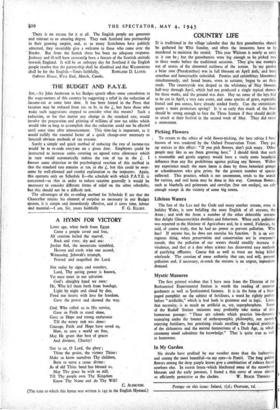COUNTRY LIFE
IT is traditional in the village 'calendar that the first gooseberries should be gathered for Whit Sunday, and often the innocents have to be murdered to maintain the record. This year Whitsun is nearly as early as it can be ; but the gooseberries were big enough, to be, picked two to three weeks before the traditional occasion. They give one example out of scores of the abnormal earliness of the season. In" my garden a briar rose (Pterakanthus) was in full blossom on April zoth,- and both cenothus and honeysuckle coincided. Peonies and columbines blossomed. simultaneously, and broad beans, sown in autumn, began to set their Seeds. The countryside was draped in the whiteness of May blossom half-way through April, which had not produced a single typical shower for three weeks, and the ground was dust. Hay on some of the leys had to be cut in April, a very rare event, and some species of grass, especially foxtail and poa annua, have already seeded freely. Can the statisticians quote a more premature spring? It is so early that much of the fruit should be strong enough to face the Three Icemen if they should decide to attack at their festival in the second week of May. They did resist a snowstorm.
Picking Flowers To return to the ethics of wild flower-picking, the best advice I have known of was tendered by the Oxford Preservation Trust. They put up notices to this effect: "If you pick flowers, don't pick many. Other people may like to see them growing here." I should think that such a reasonable and gentle urgency would have a vastly more beneficial influence than any flat prohibition against picking any -flowers. Within my experience much the most harm is done by those botanical groups or schoolmasters who give prizes for the greatest number of species collected. This practice, which is not uncommon, tends to the search for rarities, and real harm may be done in this way. Common flowers, such as bluebells and primroses and cowslips (but not oxslips), are safe enough except in the vicinity of some big towns. • Lifeless Waters The fate of the Lea and the Gade and many another stream, even in holiday Wales, is now befalling the most English of all streams, the Avon ; and with' the Avon a number of the other delectable streams that delight Gloucestershire dwellers and fishermen. When such pollution was reported to the Minister of Agriculture and, be it noted, Fisheries, he said, of course truly, that he had no power to prevent pollution. Who has? If anyone has, he does not exercise his function. It is an out- rageous thing, when preservation and conservation are in everyone's mouth, that the pollution of our waters should steadily increase in virulence, and that at a date when science has discovered easy methods
of purifying effluents. Coarse fish as well as trout are being killed wholesale. The creation of some authority that can, and will, prevent pollution and, if necessary, re-stock the streams is an urgent, immediate demand.
Mystic Manures The first printed wisdom that I have seen from the Director of the Rothamsted Experimental Station is worth the reading of amateur gardeners as well as professional farmers. It is in the form of a four- paged pamphlet on the subject of fertilisers, a word he rightly prefers before " artificials," which is bad both in grammar and in logic. Lime. that necessity, is as much an artificial as, say, superphosphate. Some of the Rudolf Steiner imitators may profitably take notice of this humorous passage: " There are schools which practice bio-dynami: manuring under the banner of anthroposophic philosophy, not merely1 rejecting fertilisers, but practising rituals recalling the magical practices of the alchemists and the mental mannerisms of a Dark Age, in which ceremony stood substitute for knowledge." That is quite true as well as humorous.
In My Garden
No shrubs have profited by our weather more than the barberries. and among the most beautiful—to my eyes—is Prattii. The long golden flowers among the deep purple leaves give a combination of colours found nowhere else. In recent frosts-which blackened some of the strawberry blossom and the early potatoes, I found a thin cover of straw almost
as efficiently protective as the clothes. W. BEACH THOMAS.
Postage on this issue: Inland, rid.; Overseas, Id.


























 Previous page
Previous page